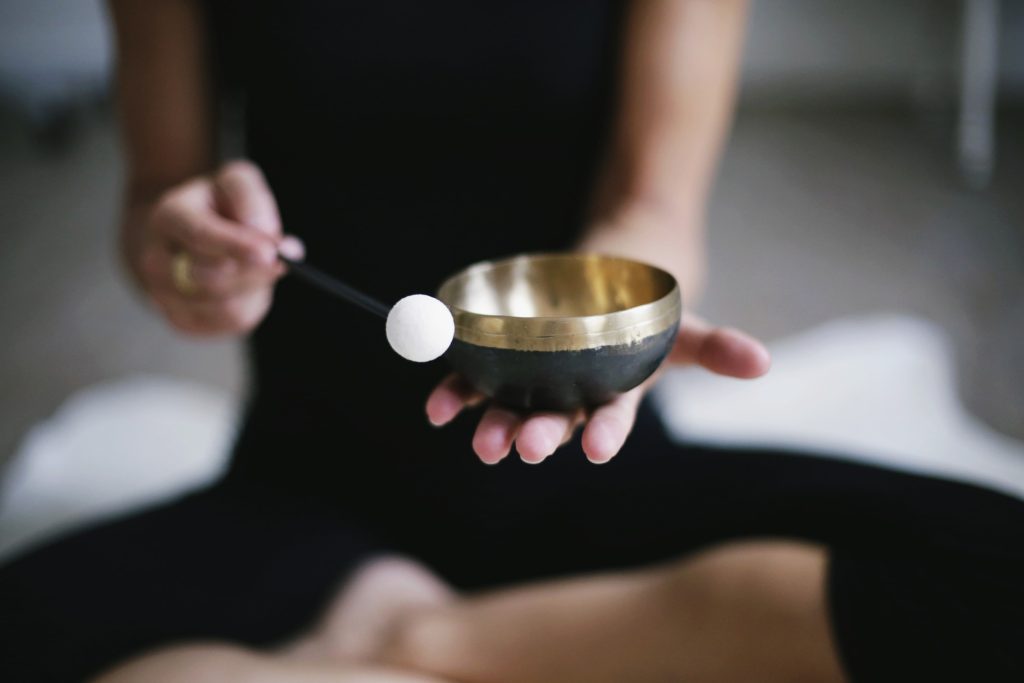
Meditation can be uncomfortable. Just like physical exercise is challenging for the body, meditation is challenging for the mind. Sitting down to meditate while remaining almost entirely still is scary for many people – and rarely something they desire to implement into daily practice.
The mental health advantages of meditation are worth investigating. Building a daily routine is more attainable than it may seem.
Meditation is an ancient practice whose brain effects have only begun to be researched in the past few decades. Like most actions, meditation changes our brains. It builds new nerve system connections and can increase (or decrease) the size of different areas of the brain.
For those of us who deal with mental health disorders, like anxiety, meditation can be an impactful tool for change. Not only does the brain shift but a meditators perspective and awareness changes as well.
Learning how to get started with meditation, build a wellness routine, and re-establish a daily practice when things fall off course, can significantly improve how successful you are in maintaining a daily meditation practice.
How to Get Started with Daily Meditation
Like any skill, meditation requires practice. An abundance of resources are available to teach the basics of meditation, including in-person meditation classes, online pre-recorded apps, and live online meditation sessions.
Guided meditations are offered in a variety of forms, such as transcendental meditation, mindfulness meditation, and loving-kindness (Metta) meditation. Each type follows a different set of rules and outcomes. Selecting the type of meditation that matches your “why” for meditating will help ensure the result you wish to obtain.
Mindfulness meditation is the act of practicing non-judgemental awareness of sensations, sounds, thoughts, and feelings. Learning the foundation of mindfulness can be beneficial for those with anxiety. It helps adapt one’s perception of unpleasant thoughts and emotions.
Technology has made it easier than ever before to find guided meditation sessions to establish a framework for meditation. Once you find a resource that fits your needs, commit to it long enough to learn how to meditate on your own.
For me, after about 1-2 months of daily 10-minute meditation sessions, I acquired fundamental knowledge to begin practicing without consistently using a guided aid.
Understanding the basics of practice also allows you to incorporate small moments of learned methods throughout the day – for instance, when you are struggling with an unpleasant emotion or eager to become more present.
After mastering the basics, you can begin practicing on your own with timed sessions while focusing on creating a routine that works best for you.
Quick Tips: How to Get Started
- Determine what type of meditation you want to learn.
- Find a guided meditation resource that works for you to learn the basics.
- Practice with a guided resource for 1-2 months daily for at least 10 minutes.
- Begin doing 10 minutes of timed meditations without guidance.
How to Maintain a Meditation Daily Habit
A daily habit is slowly forming, as you study the basics of meditation. The key is to stick to this newly formed daily habit to include meditation in your weekly wellness routine.
To make this habit as ingrained as possible, select a time of day to practice. Morning practice is useful for several reasons; it encourages a mindful mindset from the start of the day, is a simple step to add to an established morning routine, and is a foolproof way to remember to practice.
Whatever time you select, stick to it every day! The benefit of practicing for a smaller chunk of time, like ten minutes, keeps the time burden low. Humans are creatures of habit, the more regularly you practice, the more likely your practice will become part of your daily routines.
Meditation can be uncomfortable, as many are frequently confronted with unpleasant emotions or restlessness. This discomfort makes formulating excuses easy for “why not” to meditate. Regardless of what excuses your brain voices, remember your “why” and push past them.
Set the alarm on your phone to remind you when it is time to sit down for a session. Label the alarm with your “why” for meditating – to help lower anxiety, reduce depression, understand your emotions better, or be more present. Reminding yourself of your “why” will help you stay on track.
Quick Tips: How to Maintain a Daily Habit
- Select a time of day to practice – morning meditation is suggested.
- Practice daily, no exceptions.
- Set the alarm on your phone at the selected time as a reminder to practice.
What to do when you fall out of routine!
Keeping a consistent routine can be tough, and sometimes we all fall off schedule. The important part is not falling down but learning how to get back up.
Despite if you went of vacation or slowly fell out of routine, getting back on course is possible. First, you need to remind yourself why you got started in the first place.
Why did you initially learn to meditate? Did you want to relieve stress, gain emotional intelligence, work through mental challenges, or get more in touch with yourself? No matter what you “why” is, remind yourself of it every chance you can.
Place little reminders of your “why” around your home – on the fridge, nightstand, bathroom mirror, laptop desktop, or as a bookmark. Having a constant reminder prevents you from overlooking the reason why you persevere.
Maybe the original routine was not optimal, or your priorities shifted. Analyze the previous plan that was in place. Consider adjusting when to meditate, session length, and if you need a guided resource.
Build an attainable plan. Start small and grow from there. If 5 minutes a day is all that you can dedicate at first that is alright, anytime is better then no time.
Accountability is a huge factor in keeping a wellness routine functioning. Confide in a friend or loved one of your daily meditation plans or join a group on facebook. Finding a partner that also is looking to build a meditation habit will prove even more fruitful. Set up a daily or weekly check-in talks to review.
A little reward can go a long way as motivation for keeping up with any routine. You love the chocolate chip cookies from the bakery down the street, or love naps but never allow yourself to take one? If you meditate every day, reward yourself with that little gift!
Quick Tips: When You Fall out of Routine
- Remind yourself of your “why.”
- Adjust your routine – if it wasn’t working in the previous format.
- Have somebody hold you accountable.
- Set up weekly rewards if you meditate every day.



